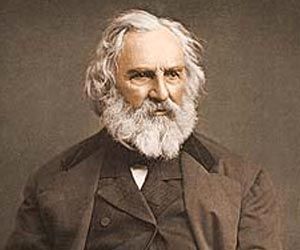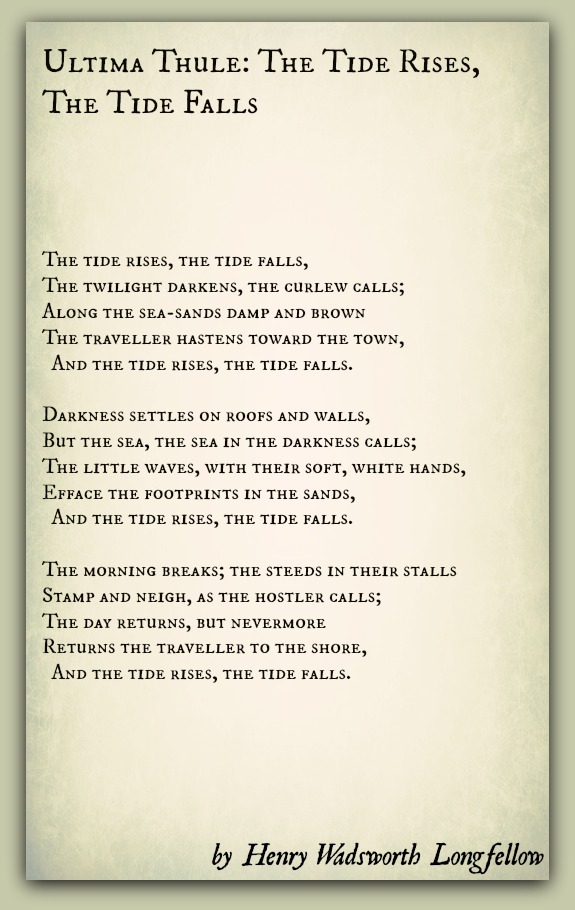
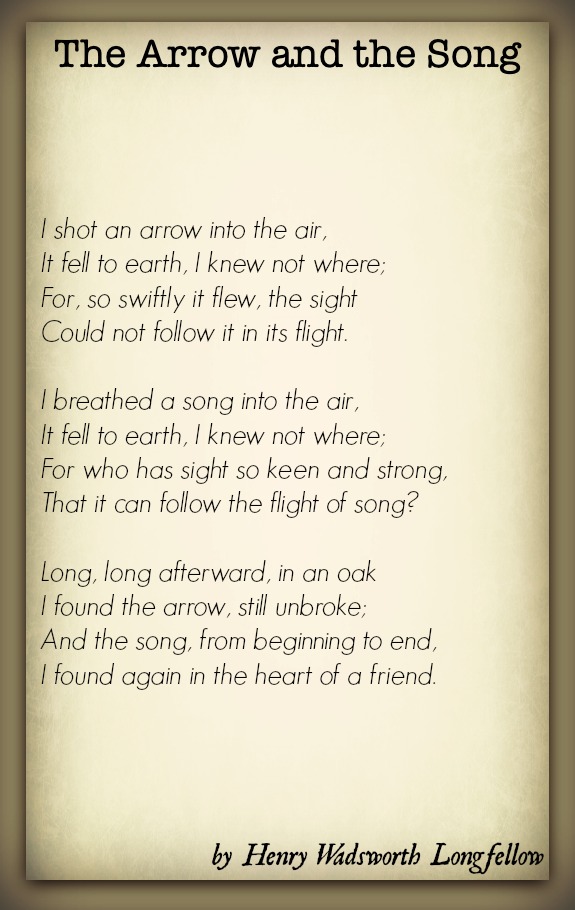
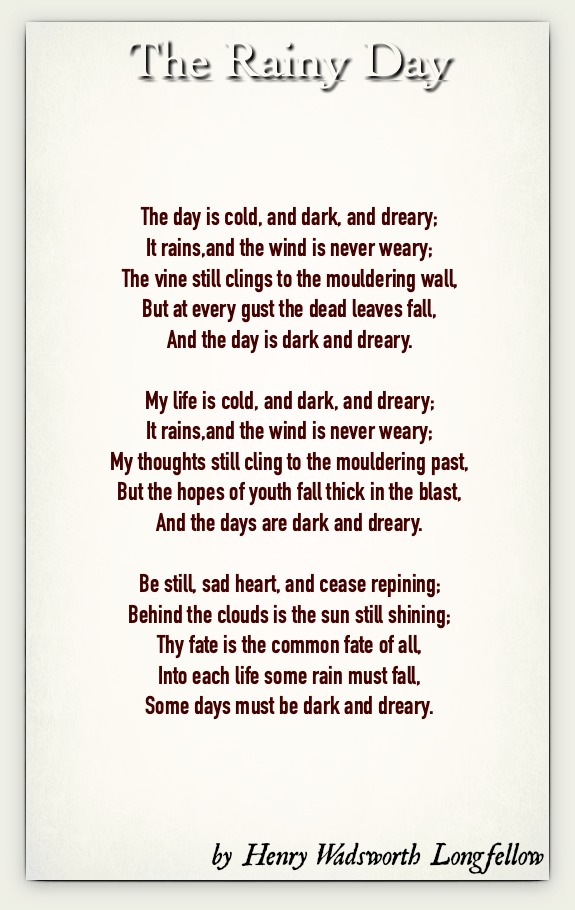
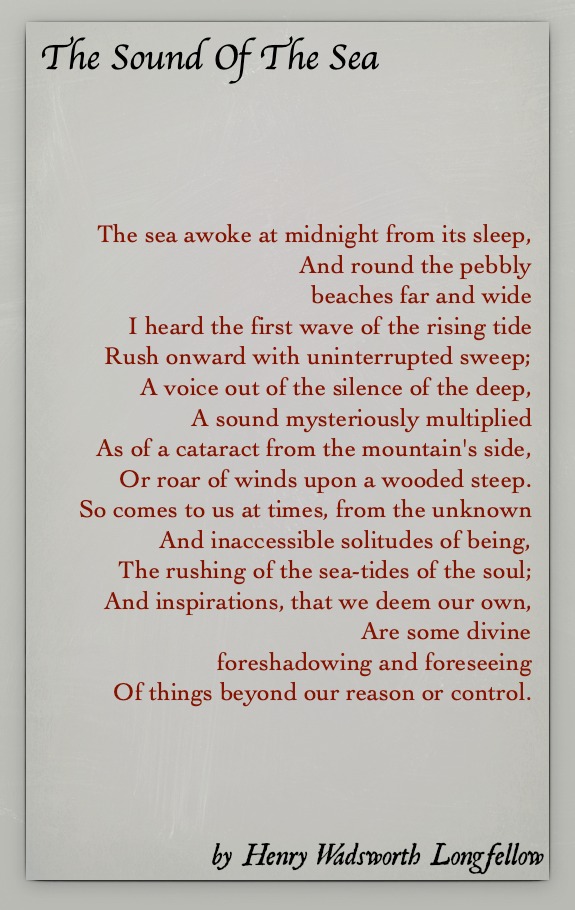
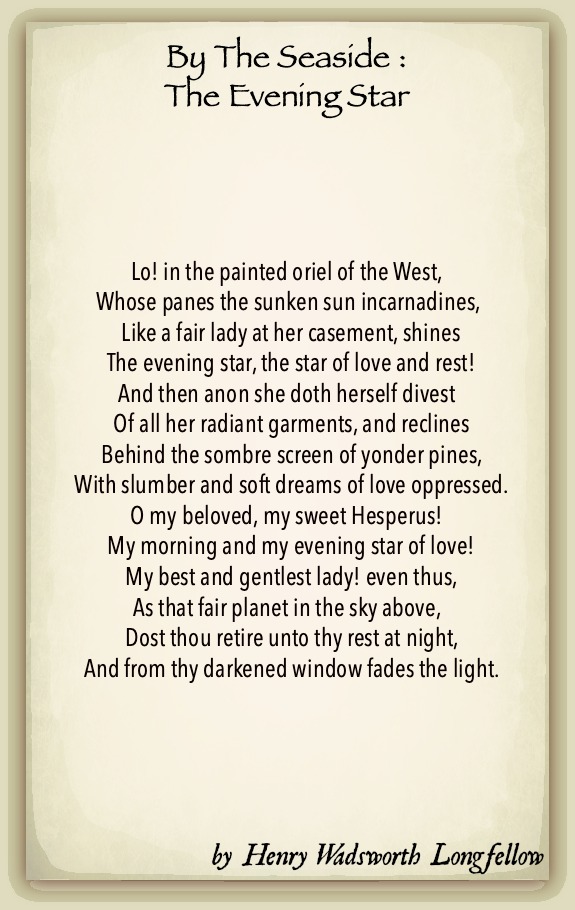
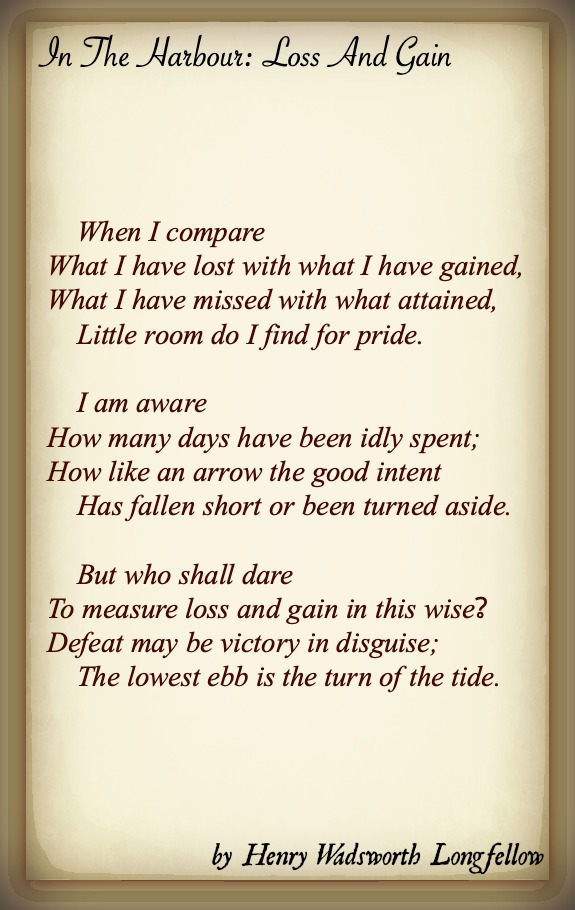
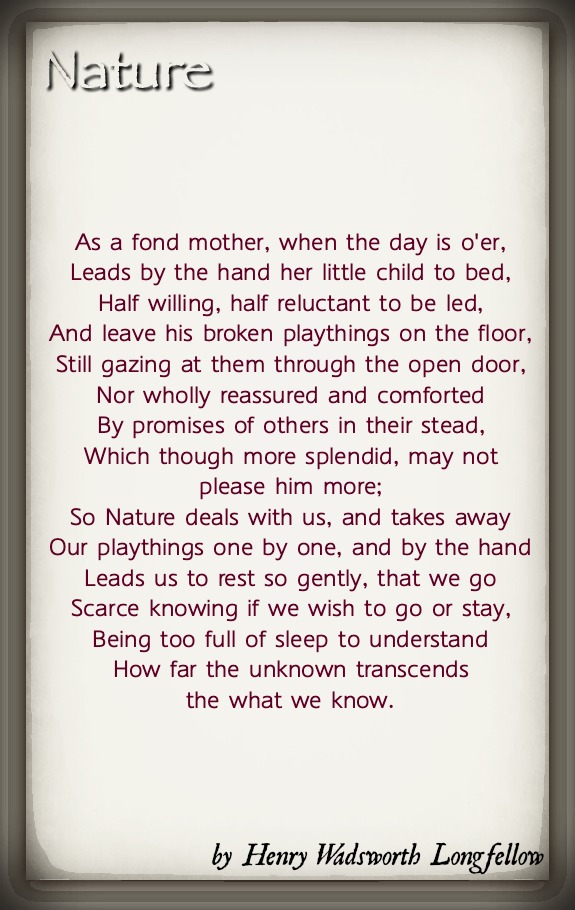
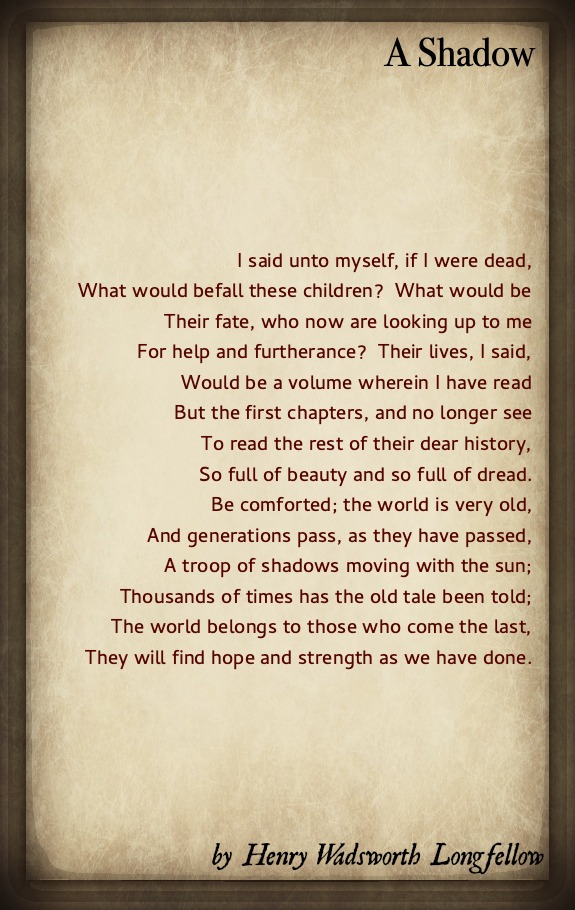
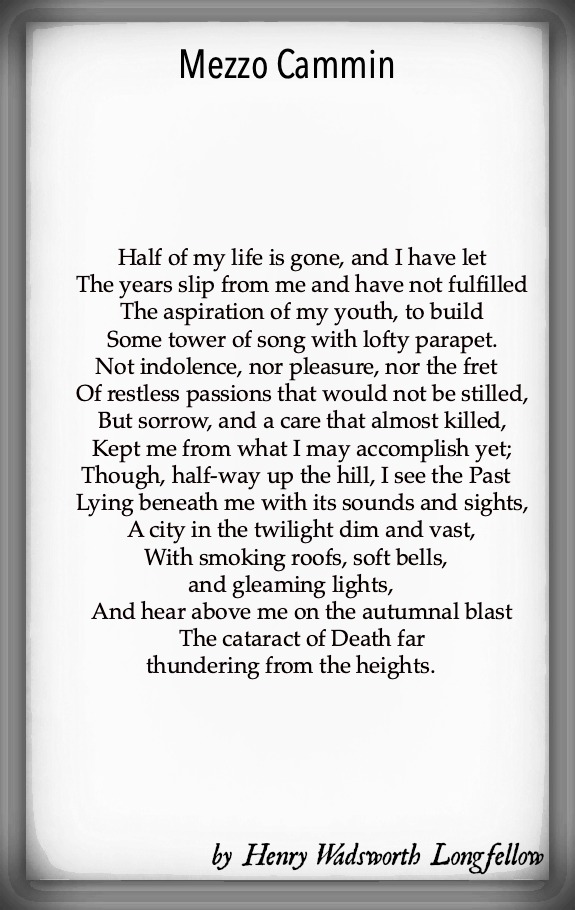
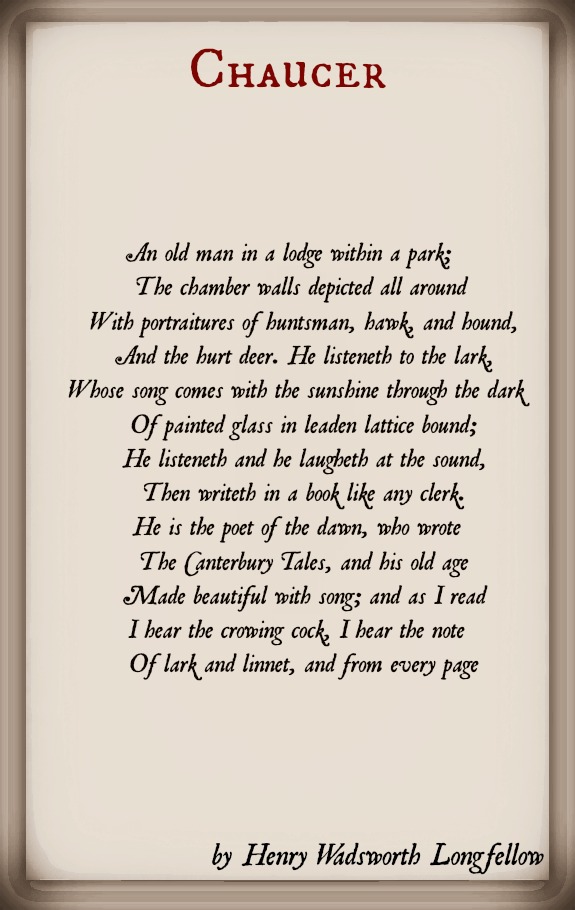
The Village Blacksmith
Under a spreading chestnut tree
The village smithy stands;
The Smith, a mighty man is he,
With large and sinewy hands;
And the muscles of his brawny arms
Are strong as iron bands.
His hair is crisp, and black, and long,
His face is like the tan;
His brow is wet with honest sweat,
He earns whate'er he can
And looks the whole world in the face
For he owes not any man.
Week in, week out, from morn till night,
You can hear his bellows blow;
You can hear him swing his heavy sledge,
With measured beat and slow,
Like a sexton ringing the village bell,
When the evening sun is low.
And children coming home from school
Look in at the open door;
They love to see the flaming furge,
And hear the bellows roar,
And catch the burning sparks that fly
Like chaff from a threshing floor.
He goes on Sunday to the church
and sits among his boys;
He hears the parson pray and preach.
He hears his daughter's voice
singing in the village choir,
And it makes his heart rejoice.
It sounds to him like her mother's voice,
Singing in Paradise!
He needs must think of her once more,
How in the grave she lies;
And with his hard, rough hand he wipes
A tear out of his eyes.
Toiling,--rejoicing,--sorrowing,
Onward through life he goes;
Each morning sees some task begin,
Each evening sees it close;
Something attempted, something done,
Has earned a night's repose.
Thanks, thanks to thee, my worthy friend
For the lesson thou hast taught!
Thus at the flaming forge of life
Our fortunes must be wrought;
Thus on its sounding anvil shaped
Each burning deed and thought!
|
Voices Of The Night :
The Reaper And The Flowers
There is a Reaper whose name is Death,
And, with his sickle keen,
He reaps the bearded grain at a breath,
And the flowers that grow between.
"Shall I have nought that is fair?" saith he;
"Have nought but the bearded grain?
Though the breath of these flowers is sweet to me,
I will give them all back again."
He gazed at the flowers with tearful eyes,
He kissed their drooping leaves;
It was for the Lord of Paradise
He bound them in his sheaves.
"My Lord has need of these flowerets gay,"
The Reaper said, and smiled;
"Dear tokens of the earth are they,
Where he was once a child.
"They shall all bloom in fields of light,
Transplanted by my care,
And saints, upon their garments white,
These sacred blossoms wear."
And the mother gave, in tears and pain,
The flowers she most did love;
She knew she should find them all again
In the fields of light above.
O, not in cruelty, not in wrath,
The Reaper came that day;
'Twas an angel visited the green earth,
And took the flowers away. |
A Gleam Of Sunshine
This is the place. Stand still, my steed,
Let me review the scene,
And summon from the shadowy Past
The forms that once have been.
The Past and Present here unite
Beneath Time's flowing tide,
Like footprints hidden by a brook,
But seen on either side.
Here runs the highway to the town;
There the green lane descends,
Through which I walked to church with thee,
O gentlest of my friends!
The shadow of the linden-trees
Lay moving on the grass;
Between them and the moving boughs,
A shadow, thou didst pass.
Thy dress was like the lilies,
And thy heart as pure as they:
One of God's holy messengers
Did walk with me that day.
I saw the branches of the trees
Bend down thy touch to meet,
The clover-blossoms in the grass
Rise up to kiss thy feet,
"Sleep, sleep to-day, tormenting cares,
Of earth and folly born!"
Solemnly sang the village choir
On that sweet Sabbath morn.
Through the closed blinds the golden sun
Poured in a dusty beam,
Like the celestial ladder seen
By Jacob in his dream.
And ever and anon, the wind,
Sweet-scented with the hay,
Turned o'er the hymn-book's fluttering leaves
That on the window lay.
Long was the good man's sermon,
Yet it seemed not so to me;
For he spake of Ruth the beautiful,
And still I thought of thee.
Long was the prayer he uttered,
Yet it seemed not so to me;
For in my heart I prayed with him,
And still I thought of thee.
But now, alas! the place seems changed;
Thou art no longer here:
Part of the sunshine of the scene
With thee did disappear.
Though thoughts, deep-rooted in my heart,
Like pine-trees dark and high,
Subdue the light of noon, and breathe
A low and ceaseless sigh;
This memory brightens o'er the past,
As when the sun, concealed
Behind some cloud that near us hangs
Shines on a distant field. |
Voices Of The Night :
Hymn To The Night
Aspasie, trillistos.
I heard the trailing garments of the Night
Sweep through her marble halls!
I saw her sable skirts all fringed with light
From the celestial walls!
I felt her presence, by its spell of might,
Stoop o'er me from above;
The calm, majestic presence of the Night,
As of the one I love.
I heard the sounds of sorrow and delight,
The manifold, soft chimes,
That fill the haunted chambers of the Night,
Like some old poet's rhymes.
From the cool cisterns of the midnight air
My spirit drank repose;
The fountain of perpetual peace flows there, —
From those deep cisterns flows.
O holy Night! from thee I learn to bear
What man has borne before!
Thou layest thy finger on the lips of Care,
And they complain no more.
Peace! Peace! Orestes-like I breathe this prayer!
Descend with broad-winged flight,
The welcome, the thrice-prayed for, the most fair,
The best-beloved Night!
|
The Day Is Done
The day is done, and the darkness
Falls from the wings of night
As a feather wafted downward
From an eagle in his flight.
I see the lights of the village
Gleam through the rain and the mist,
And a feeling of sadness comes o'er me
That my soul cannot resist:
A feeling of sadness and longing,
That is not akin to pain,
And resembles sorrow only
As the mist resembles the rain.
Come, read to me some poem,
Some simple and heartfelt lay,
That shall soothe this restless feeling,
And banish the thoughts of the day.
Not from the grand old masters,
Not from the bards sublime,
Whose distant footsteps echo
Through the corridors of time.
For, like the strains of martial music,
Their mighty throughts suggest
Life's endless toil and endeavor;
And tonight I long for rest.
Read from the humbler poet,
Whose songs gushed from his heart,
As showers from the clouds of summer,
Or tears from the eyelids start;
Who, through long days of labor,
And nights devoid of ease,
Still heard in his soul the music
Of wonderful melodies.
Such songs have power to quiet
The restless pulse of care,
And come like the benediction
That follows after prayer.
Then read the treasured volume
The poem of my choice,
And lend to the rhyme of the poet
The beauty of thy voice.
And the night shall be filled with music,
And the cares, that infest the day,
Shall fold their tents, like the Arabs,
And as silently steal away. |
Voices Of The Night :
Footsteps of Angels
When the hours of Day are numbered,
And the voices of the Night
Wake the better soul, that slumbered,
To a holy, calm delight;
Ere the evening lamps are lighted,
And, like phantoms grim and tall,
Shadows from the fitful firelight
Dance upon the parlor wall;
Then the forms of the departed
Enter at the open door;
The beloved, the true-hearted,
Come to visit me once more;
He, the young and strong, who cherished
Noble longings for the strife,
By the roadside fell and perished,
Weary with the march of life!
They, the holy ones and weakly,
Who the cross of suffering bore,
Folded their pale hands so meekly,
Spake with us on earth no more!
And with them the Being Beauteous,
Who unto my youth was given,
More than all things else to love me,
And is now a saint in heaven.
With a slow and noiseless footstep
Comes that messenger divine,
Takes the vacant chair beside me,
Lays her gentle hand in mine.
And she sits and gazes at me
With those deep and tender eyes,
Like the stars, so still and saint-like,
Looking downward from the skies.
Uttered not, yet comprehended,
Is the spirit's voiceless prayer,
Soft rebukes, in blessings ended,
Breathing from her lips of air.
Oh, though oft depressed and lonely,
All my fears are laid aside,
If I but remember only
Such as these have lived and died! |
The Poets
O ye dead Poets, who are living still
Immortal in your verse, though life be fled,
And ye, O living Poets, who are dead
Though ye are living, if neglect can kill,
Tell me if in the darkest hours of ill,
With drops of anguish falling fast and red
From the sharp crown of thorns upon your head
Ye were not glad your errand to fulfill?
Yes; for the gift and ministry of Song
Have something in them so divinely sweet,
It can assuage the bitterness of wrong;
Not in the clamour of the crowded street,
Not in the shouts and plaudits of the throng,
But in ourselves, are triumph and defeat. |
Flower-De-Luce: Christmas Bells
I heard the bells on Christmas Day
Their old familiar carols play,
And wild and sweet
The words repeat
Of peace on earth, good-will to men!
And thought how, as the day had come,
The belfries of all Christendom
Had rolled along
The unbroken song
Of peace on earth, good-will to men!
Till, ringing, singing on its way,
The world revolved from night to day,
A voice, a chime
A chant sublime
Of peace on earth, good-will to men!
Then from each black accursed mouth
The cannon thundered in the South,
And with the sound
The carols drowned
Of peace on earth, good-will to men!
It was as if an earthquake rent
The hearth-stones of a continent,
And made forlorn
The households born
Of peace on earth, good-will to men!
And in despair I bowed my head;
"There is no peace on earth," I said;
"For hate is strong,
And mocks the song
Of peace on earth, good-will to men!"
Then pealed the bells more loud and deep:
"God is not dead; nor doth he sleep!
The Wrong shall fail,
The Right prevail,
With peace on earth, good-will to men!"
|
By The Seaside :
The Fire Of Driftwood
We sat within the farm-house old,
Whose windows, looking o'er the bay,
Gave to the sea-breeze damp and cold,
An easy entrance, night and day.
Not far away we saw the port,
The strange, old-fashioned, silent town,
The lighthouse, the dismantled fort,
The wooden houses, quaint and brown.
We sat and talked until the night,
Descending, filled the little room;
Our faces faded from the sight,
Our voices only broke the gloom.
We spake of many a vanished scene,
Of what we once had thought and said,
Of what had been, and might have been,
And who was changed, and who was dead;
And all that fills the hearts of friends,
When first they feel, with secret pain,
Their lives thenceforth have separate ends,
And never can be one again;
The first slight swerving of the heart,
That words are powerless to express,
And leave it still unsaid in part,
Or say it in too great excess.
The very tones in which we spake
Had something strange, I could but mark;
The leaves of memory seemed to make
A mournful rustling in the dark.
Oft died the words upon our lips,
As suddenly, from out the fire
Built of the wreck of stranded ships,
The flames would leap and then expire.
And, as their splendor flashed and failed,
We thought of wrecks upon the main,
Of ships dismasted, that were hailed
And sent no answer back again.
The windows, rattling in their frames,
The ocean, roaring up the beach,
The gusty blast, the bickering flames,
All mingled vaguely in our speech;
Until they made themselves a part
Of fancies floating through the brain,
The long-lost ventures of the heart,
That send no answers back again.
O flames that glowed! O hearts that yearned!
They were indeed too much akin,
The drift-wood fire without that burned,
The thoughts that burned and glowed within.
|
Excelsior
The shades of night were falling fast,
As through an Alpine village passed
A youth, who bore, 'mid snow and ice,
A banner with the strange device,
Excelsior
His brow was sad; his eye beneath,
Flashed like a falchion from its sheath,
And like a silver clarion rung
The accents of that unknown tongue,
Excelsior!
In happy homes he saw the light
Of household fires gleam warm and bright;
Above, the spectral glaciers shone,
And from his lips escaped a groan,
Excelsior
"Try not the Pass!" the old man said:
"Dark lowers the tempest overhead,
The roaring torrent is deep and wide!
And loud that clarion voice replied,
Excelsior!
"Oh stay," the maiden said, "and rest
Thy weary head upon this breast!"
A tear stood in his bright blue eye,
But still he answered, with a sigh,
Excelsior!
"Beware the pine-tree's withered branch!
Beware the awful avalanche!"
This was the peasant's last Good-night,
A voice replied, far up the height,
Excelsior!
At break of day, as heavenward
The pious monks of Saint Bernard
Uttered the oft-repeated prayer,
A voice cried through the startled air,
Excelsior!
A traveller, by the faithful hound,
Half-buried in the snow was found,
Still grasping in his hand of ice
That banner with the strange device,
Excelsior!
There in the twilight cold and gray,
Lifeless, but beautiful, he lay,
And from the sky, serene and far,
A voice fell, like a falling star,
Excelsior!
|
The Bridge
I stood on the bridge at midnight,
As the clocks were striking the hour,
And the moon rose o'er the city,
Behind the dark church-tower.
I saw her bright reflection
In the waters under me,
Like a golden goblet falling
And sinking into the sea.
And far in the hazy distance
Of that lovely night in June,
The blaze of the flaming furnace
Gleamed redder than the moon.
Among the long, black rafters
The wavering shadows lay,
And the current that came from the ocean
Seemed to lift and bear them away;
As, sweeping and eddying through them,
Rose the belated tide,
And, streaming into the moonlight,
The seaweed floated wide.
And like those waters rushing
Among the wooden piers,
A flood of thoughts came o'er me
That filled my eyes with tears.
How often, oh, how often,
In the days that had gone by,
I had stood on that bridge at midnight
And gazed on that wave and sky!
How often, oh, how often,
I had wished that the ebbing tide
Would bear me away on its bosom
O'er the ocean wild and wide!
For my heart was hot and restless,
And my life was full of care,
And the burden laid upon me
Seemed greater than I could bear.
But now it has fallen from me,
It is buried in the sea;
And only the sorrow of others
Throws its shadow over me.
Yet whenever I cross the river
On its bridge with wooden piers,
Like the odor of brine from the ocean
Comes the thought of other years.
And I think how many thousands
Of care-encumbered men,
Each bearing his burden of sorrow,
Have crossed the bridge since then.
I see the long procession
Still passing to and fro,
The young heart hot and restless,
And the old subdued and slow!
And forever and forever,
As long as the river flows,
As long as the heart has passions,
As long as life has woes;
The moon and its broken reflection
And its shadows shall appear,
As the symbol of love in heaven,
And its wavering image here.
|
|
